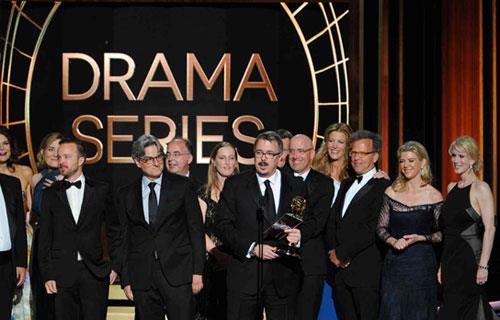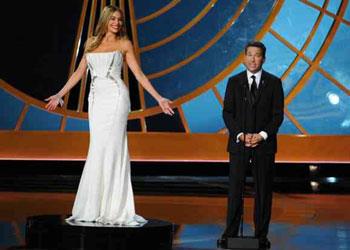
So many of this year’s Emmy categories were crammed with such strong contenders, or diluted with jarringly inappropriate competitors, you wouldn’t think the Emmy voters could get it right. But surprisingly, for the most part, they did…
The most gratifying wins of all were the ones given to AMC’s Breaking Bad, which ended on such a strong note, with such a superb final season, that it deserves to be thought of as one of the finest drama series of all time. It was – and during last night’s prime-time Emmy Awards telecast on NBC, hosted by Seth Meyers, it was embraced as such.
Breaking Bad won for Outstanding Drama Series, Best Actor (Bryan Cranston), Supporting Actor (Aaron Paul), Supporting Actress (Anna Gunn), and for writing. Good for everyone on that show – especially series creator Vince Gilligan (see photo at top), who proved that sometimes, even in Hollywood, nice guys finish first.
Best Direction, in the drama category, was taken by True Detective, for its fabulously ambitious tracking shot that ended one episode with a breathtakingly fluid yet frenzied street-level confrontation.
The fact that True Detective competed as a series, rather than a miniseries, worked well for it there – but worked against it when both Matthew McConaughey and Woody Harrelson competed as Best Actor in a Drama Series, against Cranston, who beat them both, as well as Jon Hamm of Mad Men, Kevin Spacey of House of Cards and Jeff Daniels of The Newsroom.
(I’m hoping that, without Cranston in the race, Hamm will win next year, in his final season of eligibility.)
Meanwhile, Jessica Lange, by competing in the Movies and Miniseries category instead of as a weekly drama series for FX’s American Horror Story, won another Emmy – same show, different role. And the dramas that competed in comedy categories, such as Netflix’s Orange Is the New Black and Showtime’s Shameless, came up empty.
The laughter that greeted one of Meyer’s pointed jokes about that very issue may have revealed that the black-tie Emmy voters favored competitors who truly belonged in their chosen categories.
“We had comedies that made you laugh,” Meyers said in his well-written, comfortably delivered opening monologue, “and comedies that made you cry – because they were dramas submitted as comedies.”
So no Emmys for Netflix this year, and no undeserving winners. In fact, the Emmy voters this year, while once again overwhelmingly playing favorites with their favorites (such as ABC’s Modern Family), went out of their way to acknowledge some experimental TV risktakers, like the multiple awards for PBS’s Sherlock (including best actor and supporting actor for Benedict Cumberbatch and Martin Freeman) and a comedy writing award for Louis CK on FX’s Louie.
 FX’s Fargo won three awards, including Outstanding Miniseries, but was also prominently nominated (18) while FX’s Justified was wholly ignored in that respect. But Allison Janney completed her bifecta, winning for a dramatic role in Showtime’s Masters of Sex and a comic one in CBS’s Mom.
FX’s Fargo won three awards, including Outstanding Miniseries, but was also prominently nominated (18) while FX’s Justified was wholly ignored in that respect. But Allison Janney completed her bifecta, winning for a dramatic role in Showtime’s Masters of Sex and a comic one in CBS’s Mom.
So the voting, all in all, was good this year.
And while many of the speeches and presenters were dull, give a special nod to Julia Louis-Dreyfus and Bryan Cranston, who did a great bit about her not recognizing him (even though they had a kissing scene) as a former recurring actor on Seinfeld, then calling back to it after she won Best Comedy Actress for HBO’s Veep, when he stopped her run to the stage by planting a big, long comic kiss on her. Then she remembered…
I’ll remember that bit for a long time. And Billy Crystal’s moving, from-the-heart tribute to his late friend, Robin Williams.
 And finally, I’ll remember the bit with the dull speech by the academy president – but only because of the way Sofia Vergara of Modern Family was put on a pedestal – literally – to distract and entertain the audience by showing off her good side.
And finally, I’ll remember the bit with the dull speech by the academy president – but only because of the way Sofia Vergara of Modern Family was put on a pedestal – literally – to distract and entertain the audience by showing off her good side.
Every side she showed, it turned out, was a good side…